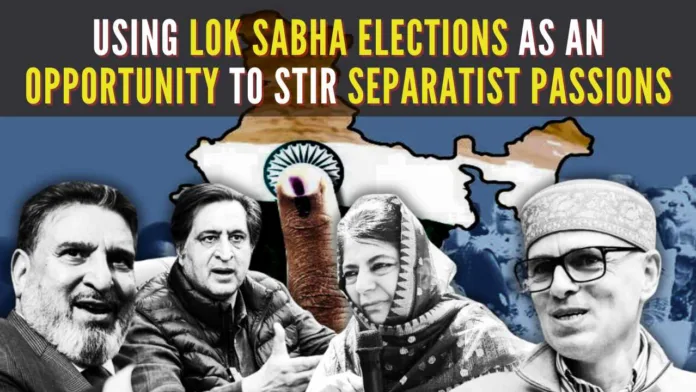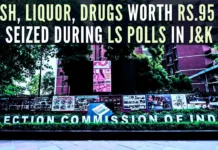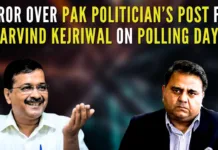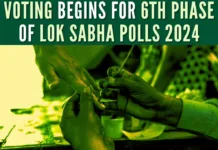
Separatist passions sparked by Lok Sabha polls
The election process across Bharat to elect a new Lok Sabha is on. It will be completed on June 1. The poll planks of the ruling party, BJP, are patriotism, national unity, and integrity, defence preparedness, pro-active foreign policy, development — both economic and infrastructural –, construction of Ram Mandir, abrogation of Article 370, triple talaq, opposition to the reservation on a communal basis, empowerment of the poor, women, the SCs, the OBCs and the Adivasis, Pakistani interference in the election process, to mention only a few.
As for the Opposition (in this case the Congress-led ragtag I.N.D.I. Alliance), it is seeking a mandate by frightening the electorate. It has unleashed a no-holds-barred propaganda blitz to create the impression that a vote for the BJP, or the Narendra Modi government, will mean subversion of the Constitution of Bharat and constitutional institutions like Election Commission and Supreme Court, end of democracy and rise of dictatorship, withdrawal of policy that empowers the SCs, the OBCs and the Adivasis to enjoy reservation in educational and professional institutions and political reservation in the Parliament and the State Assemblies.
The truth is that the ruling coalition and the Opposition are leaving no stone unturned to take on each other and induce the electorate to vote for them. And, the stated goal of the ruling coalition is to register a third consecutive victory and retain control over the Central government and that of the Opposition is to dislodge the BJP-led NDA government and establish its own rule in the country.
To be more precise, the ruling coalition has been telling the electorate that the ongoing election process is a fight between those who wish to convert Bharat into a superpower and the nation into the third-largest economy in the world by 2027 and those who have been working overtime to weaken Bharat by accentuating caste and religious angularities, or by pitting one caste against another and pitting the followers of one religion against the followers of another, and hand down to the nation an unstable dispensation. In contrast, the Opposition has been saying that the 2024 General Elections are a fight between the regressive and progressive forces and that if “secularism, democracy, and Indian Constitution” are to be saved and the SCs, the OBCs, the Advasis and the minorities are to be protected against exclusion by the “majority and communal” forces, the electorate has no other option but to vote overwhelmingly for the I.N.D.I. Alliance.
The story of Jammu and Kashmir (J&K) is somewhat different. The Kashmiri parties have taken the 2024 Lok Sabha elections to mean an opportunity to arouse communal and separatist passions in the Valley by “appealing to an exciting powerful” religio-political “appetites and individual hopes”. Their whole objective is to motivate the Kashmiri voters to come out of their houses in large numbers and vote for them so that they are able to use the floor of the Lok Sabha to tell the international community that the Central government’s August 5, 2019 decision to abrogate J&K special status which it enjoyed under (separatist) Article 370 and (discriminatory) Article 35-A and convert the erstwhile J&K State into Union Territory (UT) of J&K and UT of Ladakh was unconstitutional, against the will of the Kashmiri nation, and utterly unacceptable. It’s not an exaggeration; it’s a statement of fact.
Take, for example, what the former J&K Chief Minister Mehbooba Mufti and her Peoples Democratic Party (PDP) have been saying almost on a daily basis with a view to motivating the Kashmiri electorate to tread a dangerous and separatist path and rise in revolt against the political system as it has been existing in J&K since August 2019. They have been seeking restoration of the pre-August 5, 2019 politico-constitutional status, or semi-independence. It would be only desirable to quote verbatim certain statements made by Mehbooba Mufti and her party after April 18, 2024, to clear all the cobwebs of confusion and establish that their intentions are mischievous, divisive, and unsettling.
On April 19, Mehbooba Mufti released her party’s manifesto. Releasing it, she, inter-alia, said: “J&K has been converted into ‘an open-air prison’ after the abrogation of Article 370…The Centre’s ‘unilateral decision’ is ‘unacceptable’ to the people of the UT…The unilateral decisions, stifling of just voices, and erosion of constitutional guarantees are unacceptable…We will tell this to the people of the country in Parliament…Our mission is to go to the Parliament and raise the issues facing the people. Everything, all our resources, minerals are being sold..outside the State…There has been an unending onslaught on our collective identity, land, jobs, resources, and infringement upon the freedom to speak…There is a ‘dire need’ to raise the voice against ‘this onslaught on the floor of the Parliament’. Right from the drastic changes to state subject and land laws to the outsourcing of our resources by gifting contracts to outsiders. Even developmental projects are being handed over to non-locals…”[1]
On April 20, Mehbooba Mufti, among other things, said: “As of now, J&K has the highest rate of unemployment (rate of unemployment in Kashmir is less than 30%, as against over 69% in Jammu); our identity is in danger. They (the Central government) want to snatch everything from us, and we will make sure that we speak for the people. We are not dead because the dead belong to the graveyard, and those who are alive speak”. She also urged the Kashmiris “not to resort to ‘election boycott’ this time, rather come out and vote in huge numbers for a greater cause”[1].
On April 21, the PDP, inter-alia, said: “Don’t treat this election as less than a referendum… Your vote should become your referendum’. There is a need to send a message to New Delhi – that don’t treat the silence of Kashmir as happiness. People are silent but they are not happy with you (New Delhi)…It is not about a win or a loss. Can we send a message to New Delhi that we are not happy? Can we tell New Delhi that we have fears about our identity, our land, our jobs, contracts, and minerals…There are issues beyond Article 370 too…The issue is not what happened on August 5 (2019). The issue is of the entire Kashmir problem…”[3]
On April 23, Mehbooba Mufti, among other things, said: “Kashmir issue will not be allowed to be forgotten. (Abrogation of Article) 370 did not resolve the Kashmir issue; rather, it further complicated it; time will come when they will understand what they have done with J&K…This time, 10, 20, or 30 percent won’t work; you have to cross 70 percent voter turnout; we have to tell them (Central government) that the decision taken in 2019 is not acceptable to the people of J&K…Kashmiris remain silent and at times, they even appear dead but when it comes to it, they show what is right and what is wrong…”[4]
On April 27, Mehbooba Mufti, inter-alia, said: “The people, irrespective of their religion and region, have to move together and raise a united voice to seek redressal of their issues…This election is not for roads and electricity…”[5]
On April 29, she, among other things, said: “This is not an Assembly election. This is not about whether the PDP, the National Conference, or the Congress will win. This election is about sending a message that the decisions taken in 2019 and what followed are not acceptable to the people…The people of J&K have witnessed tough times in the past. Those did not last and neither will this (situation), but only if we fight it together…The ongoing elections are a crucial opportunity for the people of J&K to amplify the voice of the region in Parliament…This election surpasses partisan politics and is about sending a strong voice to Parliament so that those sitting comfy at the echelons of power hear our just voices…We want to tell them that our resources are ours, our identity is ours, our jobs are ours. The plunder of our hydroelectricity is being carried out in the open while the disenfranchised people of J&K are reeling under darkness, their jobs are being given to outsiders, and their lands are being taken away from them. They have been virtually choked to death…Therefore, understand that the present polls are not the Assembly elections aimed at providing civic amenities to the people. These elections are about our rights and about our fight to get them back…”[6]
On May 2, Mehbooba Mufti, inter-alia, said: “The ongoing Parliamentary elections in J&K are about speaking up against injustice and not for seeking basic amenities. The anger that the people of J&K have been holding inside, regarding the unconstitutional and illegal revocation of Article 370, needs an outlet for expression. Therefore, I believe these elections are crucial for enabling people to express themselves…Through this election, people have to express their resentment against the Government of India’s decision that was made in August 2019. These elections are not for issues like electricity and water but rather what transpired in the Parliament in 2019 wherein ‘a brute majority was used to bulldoze the constitution of this country. So, against that decision, the people of J&K are trying to tell that the decision was unacceptable to them and these elections are primarily for that…’ We joined hands with the BJP (in 2015) because of the policies of Vajpayee. We didn’t only join hands but also tied their hands and by this we did not allow them to touch Article 370 for 3 years. I withdrew the FIRs of 12,000 youth, worked out a ceasefire, and brought an all-India delegation to the doors of Hurriyat leaders…”[7]
The attitude of other Kashmiri parties is no different. Take, for example, what the National Conference (NC) candidates from Baramulla, Srinagar, and Anantnag-Rajouri seats – NC vice-president and former J&K Chief Minister Omar Abdullah, Shia leader Agha Syed Ruhullah and Gujjar leader and former minister Mian Altaf – have said.
Omar Abdullah – apart from urging the Kashmiri electorate to “vote wisely” and “choose a representative, who will espouse our causes and fight our fights in the Lok Sabha for the next five years” – has, among other things said: “We are fighting them (BJP government) as part of a bloc. That bloc is committed to certain protections for J&K. We are hoping that on June 5, when the results come out, you will have a government in the Centre that at least as far as we are concerned — the I.N.D.I.A bloc of constituents — will be able to sit down to evolve a mechanism or a system of identity protection. Plus, with amazing regularity, the Government of India hands out assurances to the people of Leh. First, they promise them the Sixth Schedule and step back. Now there’s talk of other models of protection. We are two territories that were born of the same womb. We have the same concerns. We had the same protections prior to August 5, 2019. Whatever you’re giving them should also be given to this part of J&K…”[8][9]
What has Agha Syed Ruhullah said? He has, inter-alia, said: “…But this election is not the end. We have a greater cause and a more important objective than parliamentary elections. If we are serious about our dignity and rights, we must unite. After this election, we need to regroup and find ways to move forward together…On the surface, everything appears to be going well. But is it sustainable? Has the core issue been addressed? Is the current calm due to a lack of anger or suppression of that anger? If peace is maintained through suppression, it isn’t sustainable. If underlying anger persists, it can erupt at times. The people of J&K feel defeated and helpless, and with this sentiment, lasting peace is unattainable…”[10]
As for Mian Altaf, he has, among other things, said: “Everywhere I’ve been, discontent over the August 2019 decision prevails. People haven’t accepted it, whereby a full-fledged State was divided into two UTs, unheard of in history. Our focus will remain on seeking the rectification of this decision through the Lok Sabha elections. We will represent the sentiments of the people, making it our prime focus… People’s focus in this election is not seeking basic amenities for them but Article 370 and its related matters…People feel that their rights are being snatched away post-Aug 2019 and his party’s priority will be to raise the issue in the Parliament…people feel that their land is being taken away. Their rights are being snatched. Our priority will be to present the issues of a political nature; people’s issues in Parliament…”[11]
So, this is the whole situation. And, still, some elements have been vouching for Assembly elections in J&K willfully suppressing the truth: The Assembly elections will automatically mean a re-rise of the Kashmiri Islamists’ rule because the demographic profile of J&K is such – the rule that muddied the waters of Bharat in Kashmir and put the Kashmiri Muslims on the road to secessionism, coupled with a senseless orgy of death and destruction. The nation can’t afford the reemergence of those on the political horizon of J&K who are squarely responsible for what happened in J&K between October 1947 and June 2018. The lasting solution lies in J&K’s further reorganization: Conversion of Kashmir into a Chandigarh-type UT and grant of full state status to Jammu province. It’s hoped the powers-that-be in the South and North Blocks would do what is required to be done. It was not for nothing that former President R Venkataraman had asked PM Indira Gandhi to grant UT status to Ladakh, make Jammu a separate state, and deal with Kashmir separately.
Note:
1. Text in Blue points to additional data on the topic.
2. The views expressed here are those of the author and do not necessarily represent or reflect the views of PGurus.
References:
[1] Lok Sabha Elections 2024: PDP releases poll manifesto, Mehbooba alleges J-K converted to ‘open air prison’ – Apr 19, 2024, India News
[2] Elections crucial for J&K’s identity, resources: Mufti – Apr 21, 2024, Daily Excelsior
[3] ‘Kashmir’s silence doesn’t indicate happiness’: PDP’s Srinagar candidate asks voters to ‘send a message to New Delhi’ – Apr 20, 2024, Indian Express
[4] Abrogation of Art 370 complicated K-issue: Mehbooba – Apr 24, 2024, Daily Excelsior
[5] All have to move together to seek redressal of problems: PDP chief – Apr 27, 2024, The Print
[6] Register vote to express unhappiness over abrogation of Art 370: Mufti – Apr 30, 2024, Daily Excelsior
[7] This election is about speaking up against injustice: Mufti – May 02, 2024, Daily Excelsior
[81] “Choose Wisely”: Omar Abdullah Tells Voters In Jammu And Kashmir – Apr 11, 2019, NDTV
[9] Omar Abdullah: ‘BJP symbol won’t be on the machine but it’s very much part of Kashmir’s electoral process’ – Apr 30, 2024, Indian Express
[10] ‘People of J&K turned into second-class citizens’: An interview with NC’s Srinagar candidate Agha Syed Ruhullah – Apr 29, 2024, Deccan Herald
[11] People have not accepted Aug 2019 decision on J&K: Mian Altaf – May 3, 2024, Daily Excelsior
For all the latest updates, download PGurus App.










